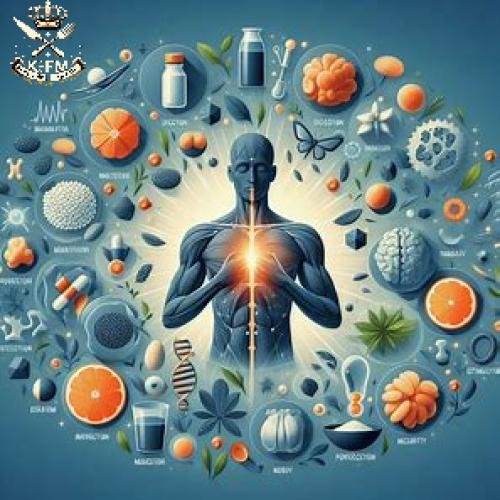Today, we will discuss an important topic that concerns everyone: anxiety, stress, and their relationship with nutrition. Nutrition experts and health scientists agree that certain foods have a direct impact on treating neurological disorders, as they help reduce stress levels and provide a sense of calm and relaxation. In this article, we will explore these foods, their benefits, and how to incorporate them into your diet.
Foods That Help Reduce Anxiety and Stress
Nutrition experts and health scientists confirm that some foods have a direct relationship with treating neurological disorders, reducing stress levels, and creating an environment of comfort, calm, and reassurance. These foods also help alleviate headaches and stomach pain. Some of the foods that achieve these goals contain a variety of vitamins and minerals.
Ingredients:
- Vitamins:
- Vitamin A
- Vitamin B Complex
- Vitamin H
- Minerals:
- Magnesium
- Potassium
- Phosphorus

Sources of Vitamins and Minerals:
- Fruits such as: dried dates, dried grapes, dried figs.
- Whole grains such as: wheat, barley, oats.
- Leafy vegetables such as: lettuce, onions, garlic, leeks.
Benefits of These Foods:
- These foods contain valuable nutritional gems that are closely and directly related to the nervous system, which extends throughout the body, weighs about 2 kg, and has approximately 14 billion cells.
- These foods are easy to digest (such as dates and raisins), stimulate muscles (like grains), and strengthen nerves (like legumes).
- They help provide a sense of calm and relaxation, relieving tension, emotional stress, headaches, and stomach pain.
- They contribute to purifying the blood from harmful substances and help the body recover from the effects of digesting heavy meals that contain high amounts of fats and animal proteins.
Effect of Harmful Foods:
- Foods that are high in fats and animal proteins (such as fatty red meats, eggs, and fatty poultry) increase the acidity of the blood, leading to feelings of exhaustion, stress, and irritability.
- These conditions negatively impact the health of the body, leading to confusion, insomnia, nervous irritation, heart disorders, indigestion, rapid heartbeats, spasms, and mood swings.
Nutrition and Its Role in Reducing Anxiety and Stress
Nutrition directly impacts mental health, as certain foods provide the body with nutrients that help calm the nervous system and reduce stress, while others increase anxiety and irritability. For instance, a deficiency in essential vitamins and minerals, such as magnesium and B vitamins, can exacerbate feelings of anxiety.
The Effect of Nutrients on the Nervous System and Reducing Anxiety
Magnesium: It plays a major role in reducing cortisol levels, the stress hormone. It also helps relax muscles and improve sleep quality. It can be found in almonds, spinach, and bananas.
B Vitamins: Especially Vitamin B6 and B12, they help produce neurotransmitters such as serotonin and dopamine, which improve mood and reduce anxiety. They are found in whole grains, eggs, and avocados.
Potassium: It helps regulate blood pressure and improves the body's response to stress. It is available in bananas, sweet potatoes, and beans.
Omega-3: These fatty acids reduce inflammation in the brain and improve mood, and can be found in fatty fish like salmon and flaxseeds.
Tryptophan: An amino acid that boosts serotonin production, helping to improve mood and relaxation. It is found in dark chocolate, walnuts, and milk.
Foods That Contribute to Reducing Anxiety and Stress
Dried fruits like dates and figs, which contain magnesium and potassium.
Leafy greens like spinach and lettuce, which help calm the nerves.
Nuts like almonds and walnuts, rich in healthy fatty acids.
Whole grains like oats and whole wheat, which contribute to better nervous system health.
Green tea, which contains calming amino acids like theanine.
Harmful Foods That Increase Anxiety and Stress
Yes, some foods can exacerbate stress and anxiety, including:
Foods Rich in Refined Sugar: They cause sharp fluctuations in blood sugar levels, increasing anxiety and irritability.
Fried Foods: They increase inflammation in the body, which affects brain health and mood.
Caffeine-Rich Beverages: Such as excessive coffee and energy drinks, which may increase heart rate and feelings of nervousness.
Processed Meats: Contain preservatives that cause hormonal disruptions, potentially leading to increased stress.
Practical Tips for Reducing Stress Through Nutrition
- Eat balanced meals that contain healthy proteins, good fats, and complex carbohydrates.
- Increase your intake of warm soups, such as lentil soup, which are rich in magnesium and iron.
- Drink herbal teas like chamomile, mint, and anise, which help to relax.
- Eat dark chocolate with 70% or more cocoa, as it helps release happiness hormones.
- Reduce caffeine consumption and replace it with green tea or warm milk.
Lifestyle Tips for Reducing Stress
Nutrition plays an important role, but it is not the only solution. Some other healthy habits that help reduce anxiety include:
- Regular physical activity such as walking or yoga, which helps reduce stress hormones.
- Good sleep, as lack of sleep increases stress.
- Practicing meditation and deep breathing exercises to calm the nervous system.
- Avoiding negative news and reducing prolonged use of social media.

Frequently Asked Questions
How long does it take for a healthy diet to affect mental health?
It varies from person to person, but typically changes begin to appear after two weeks to a month of following a healthy diet.
Are there any supplements that help reduce stress?
Yes, some supplements like magnesium, Omega-3, and Vitamin (B6) can help improve mood, but it is recommended to consult a doctor before taking them.
What is the best diet to maintain the health of the nervous system?
- Eat leafy vegetables daily.
- Increase the intake of foods rich in magnesium and potassium.
- Reduce the consumption of sugars and processed foods.
- Drink sufficient amounts of water.
Are there any herbal drinks that help reduce stress?
Yes, such as:
- Chamomile tea: Contains natural compounds that calm the nervous system.
- Mint tea: Helps relax muscles and relieve stress.
- Warm milk with honey: Contains tryptophan, which promotes restful sleep.
What are the wrong eating habits that increase anxiety?
- Excessive caffeine intake.
- Relying on fast food.
- Skipping breakfast, which leads to low blood sugar and increased stress.
For this reason, nutrition and health experts believe that the mentioned foods help individuals enjoy a sufficient level of calm nerves, peace of mind, and psychological reassurance, as well as relieve anger, stress, anxiety, and bad moods.




















